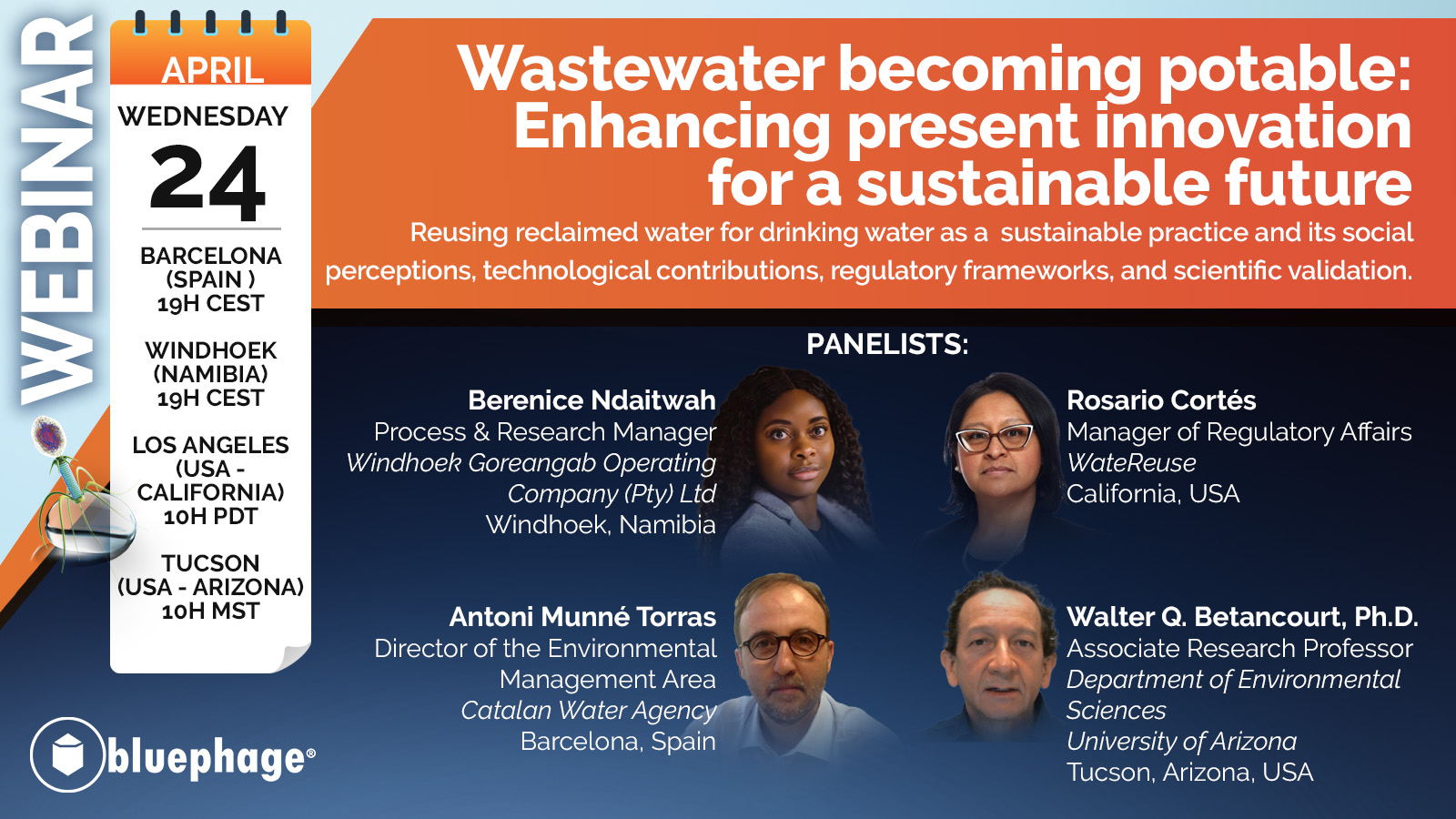BLOG | Bluephage
WEBINAR: Wastewater becoming potable: Enhancing present innovation for a sustainable future

The webinar will focus on the reuse of reclaimed water, exploring its application in potabilization and raising key questions about the sustainability of this practice in the future.
Join us for an enlightening webinar hosted by Bluephage to delve into the critical topic of wastewater reuse and its application in potabilization. Scheduled for Wednesday, April 24th, at 7 pm CEST / 10 am PDT, this webinar aims to unite professionals from diverse regions like California, Namibia, and Spain to share experiences and solutions in addressing water challenges.
Overview: In collaboration with esteemed professionals, we’ll explore innovative approaches and successful case studies in wastewater reuse:
- California Direct Potable Reuse (DPR) Initiative: Learn about the groundbreaking DPR initiative by the WateReuse Research Foundation and WateReuse, featuring insights from Rosario Cortés on establishing DPR as a sustainable water supply option.
- Windhoek Goreangab Operating Company, Namibia: Gain valuable insights from Berenice Ndaitwah on the company’s 50 years of experience in transforming wastewater into drinking water, showcasing real-world applications.
- Metropolitan Area of Barcelona: Understand the practices employed in Barcelona to combat prolonged drought, with Antoni Munné shedding light on their approach.
- Insight from the academia: assess pathogen removal throughout the water purification process guided by Dr. Walter Q. Betancourt, renowned expert in Environmental Virology from the University of Arizona
Key Discussion Points: During the webinar, we’ll address pivotal questions to foster a deeper understanding of wastewater reuse:
- Is direct and indirect reuse of reclaimed water for potabilization the right sustainable technique for the future?
- How can we effectively communicate the benefits and safety of this practice to society?
- What technological advancements support the implementation of wastewater reuse, and how do we ensure water quality?
- What role do regulations and the scientific community play in validating and promoting this practice?
Comparative Analysis: Furthermore, we’ll compare wastewater reuse with desalination, highlighting the cost-effectiveness and environmental sustainability of each approach, providing attendees with a comprehensive perspective on water management strategies.
Moderator: Julia Martin, Chief Development Officer at Bluephage, will lead the discussion, ensuring insightful dialogue and a meaningful exchange of ideas.
Panelists:
Berenice Ndaitwah, Process & Research Manager. Windhoek Goreangab Operating Company (Pty) Ltd. Windhoek, Namibia.
Berenice is a Chemical & Process Engineering Professional with 10 years of experience in plant control, optimization & operation; process research development and water utilization engineering. Working in industries such as mining, waste water reuse and drinking production. She currently serves as an executive committee member of the Upper Swakop Basin Management Committee, as well as the Global Water Partnership – Namibia and has presented reuse globally at the WWW for SIWI, as well as the IWA conferences.
Rosario Cortés, Manager of Regulatory Affairs , WateReuse, California, USA
Rosario represents WRCA in a myriad regulatory activities involving recycled water including the implementation of the water use efficiency legislation, the development of the Cross-Connection Control Policy Handbook, the Clean Water State Revolving Fund (CWSRF) and other funding issues, the onsite reuse regulations, and more. She provides support and legislative and regulatory information to our seven chapters and standing committees. Rosario has 20-plus years of experience in California water policy. In addition to working for two members of the California State Legislature, a governor, and as a contract legislative advocate, she held several high-level positions for water-related associations, including the Association of California Water Agencies, the California Municipal Utilities Association, and most recently, the California Special Districts Association.
Antoni Munné Torras, Director of the Environmental Management Area, Catalan Water Agency, Barcelona, Spain
Majored in Biology (University of Barcelona) and PhD in Ecology (University of Barcelona). Currently works as Director of the Environmental Management Area at the Catalan Water Agency (public water authority in charge of water planning and management at the Catalan River Basin District. NE Spain). Over 30 years experienced on water management, water quality, aquatic ecosystems restoration, drought management, water reuse, and environmental flow implementation, especially in Mediterranean basins. Redactor of successive river basin management plans and its updates of the Catalan River Basin District according to the EU Water Framework Directive (2000/60/EC). Authored or co-authored of over 60 publications in international indexed journals, scientific and technical book chapters, and technical monographs regarding water management, chemical and ecological status assessment, and water quality monitoring. Recently received the innovation water reuse prize (2023) from the Water Reuse Europe Association regarding the work based on indirect potable water reuse in Barcelona city to face drought events.
Walter Q. Betancourt, Ph.D. Associate Research Professor, Department of Environmental Sciences, University of Arizona, Tucson, Arizona, USA
He is an Environmental Virologist with a Ph.D. in Marine Science from the College of Marine Science, University of South Florida. He is an Associate Research Professor of the Department of Environmental Sciences at The University of Arizona. He has been working intensively on methods for recovery and detection of waterborne human pathogenic viruses in waters. He works collaboratively with academic and industry peers to investigate integrated membrane systems as well as carbon-based membrane processes and the influence of operational parameters on virus occurrence and reductions by potable reuse treatment trains. He also applies microbial source tracking methods to evaluate sources of fecal contamination of agricultural waters in the State of Arizona and in environmental aerosols from confined animal feeding operations to evaluate exposure risks to zoonotic pathogens.
Don’t miss this opportunity to engage with experts and peers in the field, as we navigate the future of water sustainability together. Register now to secure your spot in this thought-provoking webinar.


